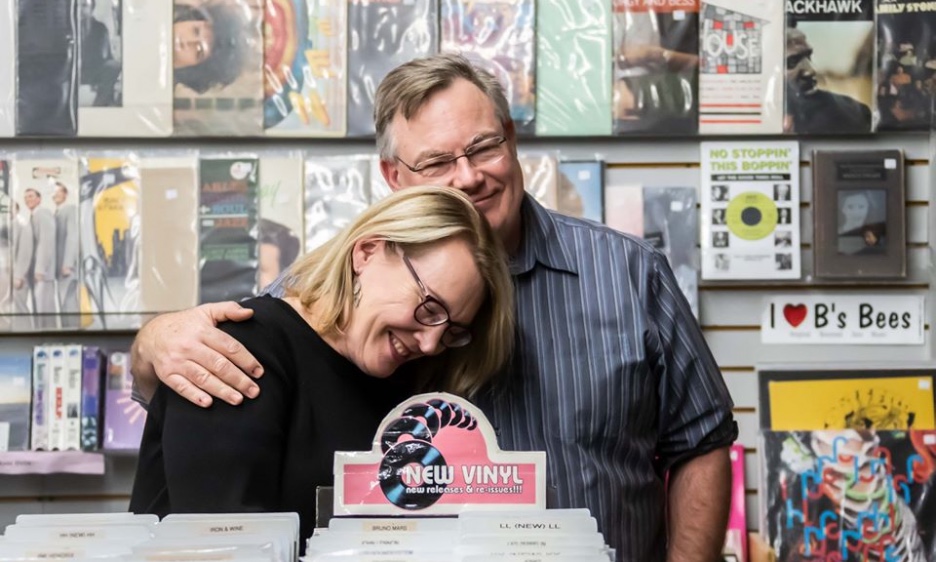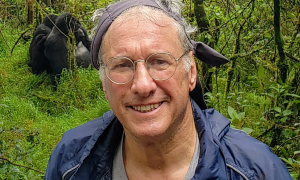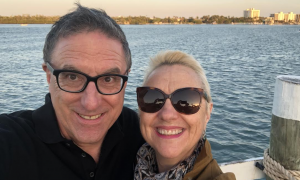Home » Jazz Articles » Out and About: The Super Fans » Meet Tom Kohn
Meet Tom Kohn

My first job was in a record store in high school and by the time I was 20 I had probably 2,000 albums and was going to every concert I possibly could.
Tell us a bit about yourself.
I was born and grew up in Rochester, New York, where I still live and own a record store, Bop Shop Records. I have a "regular irregular" schedule of live performances there. My first job was in a record store in high school and by the time I was 20 I had probably 2,000 albums (I had taken over my parent's basement) and was going to every concert I possibly could. After high school I worked for a guitar effects company, MXR, as a production tech doing in-house repairs and testing. I also worked for then-distributor Rounder Records doing sales in all the stores, where I learned so much about every genre. And then I lost my son and that changed my life. I decided to refocus my energies and start selling records.I started out buying and selling used records in 1982 at a semi-permanent weekly flea market store (also called Bop Shop), which morphed into the physical record store by the mid-'80s. I've also been presenting jazz and other music there since around 1988. No artists were coming up to Rochester in those days and I was blowing $500 bucks to fly down to hear music in New York. So I thought why not invite people to come here and play and pay them the $500 instead.
Since then, the record business has been through many ups and downs. Rollercoaster is a mild way to put it. It's been through hell and back for a lot of different reasons but right now it's good. We're enjoying a really healthy resurgence of interest in vinyl. And there's a lot of great music out there at the moment—especially in jazz. In bad political climates the arts tend to flourish because people have more to say. Record stores are an important link between the people who create music and the people who listen to music, and it feels good to be a link in that chain.
What is your earliest memory of music?
We didn't listen to a lot of music at home. My parents had the Kingston Trio records and Tom Lehrer in their collection of about 20 records. Lehrer sang funny songs that worked my mind pretty early on. Then, by high school, I was listening to Pink Floyd and The Who and all that stuff. The Kinks were my first favorite band.How old were you when you got your first record?
I was given a box of 45s from a relative when I was about 12, but I can't remember what they were. I mostly learned about bands like the The Beach Boys from my friends' older siblings. When I was a teenager a friend gave me his record collection—a crate of British Invasion records: Pretty Things and The Move—which I loved.What was the first concert you ever attended?
Elton John. It was my first big concert and I was pretty high. I liked it but I didn't fall in love with his stuff. But there was a band called Family which opened for him, and I really liked them. They were kind of like psychedelic jazz. I liked the saxophone and the way Roger Chapman sang and wrote songs. It was so unusual. I immediately checked them out and bought their records. I actually met Roger Chapman in England years later. That was a thrill.Was there one album or experience that was your doorway to jazz?
I loved Julie Driscoll's 'Wheels on Fire' and 'Tramp.' Then when I was working at the store in the early '70s I saw a Carla Bley record, Tropic Appetites, that had Driscoll on it when she was called Julie Tippets— after she married Keith Tippets. She had left pop and gone into singing more free jazz. And that was my introduction to the genre. My first jazz record that I specifically remember going "Holy shit, what's that about?" was Miles Davis' Jack Johnson. I was already into Soft Machine and that stuff, but after that, and the Carla Bley record, it was all out. And then I saw the Anthony Braxton Trio with Dave Holland and Barry Altschul. It just led on from there. By the time I was 20 I had 1,000 jazz records.How long have you been going out to hear live music?
Since 1972How often do you go out to hear live music?
At least once a week. >What is it about live music that makes it so special for you?
Emotion, spontaneity and passion! And sometimes a little humor. It's a connection you have with another human. As an artist does what he does, you look for that bridge that ties you up with whoever it is. It can come in different forms. You are at a concert and all of a sudden magic happens. My favorite example is Michael Blake at The Xerox Rochester International Jazz Festival. I went to the first set and it was killing. Then at the second set—it was at the Montage club—they really got going. They were so connected and did an encore that lasted 45 minutes and it was just this magical thing. I don't even know how they got back to the hotel. When I saw Ramsey Lewis, Anthony Braxton opened for him. Everyone hated it except about 15 of us in the front row who were all loving it. It's almost tribal in some way. It's why I like intimate venues and my store. You can hear a pin drop. You're in the same air and hearing the same breath.What are the elements of an amazing concert?
A pure connection between the artist and the audience. >What is the most trouble you've gone to or the farthest you've traveled to get to a jazz performance?
I drove 800 miles to Iowa City for The Iowa City Jazz Festival specifically to see Allison Miller's Boom Tick Boom. My wife and I are huge fans of all the band members. We got to the festival and Jan's phone rang and her dad had died. So we just sat down and watched Boom Tick Boom. It was therapeutic. The festival has a beautiful atmosphere.Is there one concert that got away that you still regret having missed?
Muddy Waters. One of those guys who was around a lot in the '70s and I feel I should have known better than to miss out on. I wish I was old enough to have seen Miles when he was at the Nugget, a local club, when I was about 15. I was still a rock kid then.If you could go back in time and hear one of the jazz legends perform live, who would it be?
John Coltrane, Thelonious Monk, Charles Mingus and Miles Davis, not just because they move my soul, but because all of them were doing things that foreshadowed what was to come. They were the game-changers.What is it about your favorite clubs that makes them your favorites?
I went to see someone in a beautiful room recently. It was a really lovely venue. And of course this couple were talking. This inevitably happens when you go out to a club. But at my own venue—a space at the back of my store, BopShop Records—that never happens. It's a listening room. Talk between tunes, if you like, talk afterwards, but don't talk during the music.Tell us more about the venue part of the shop.
I have drums, piano, amps, everything anyone needs. It seats 60 people and we charge a cover on the door—all of which goes to the musicians. Sometimes I have to supplement if I don't make the guarantee. But it's worth it. We have had so many people—the ICP Orchestra, Steve Lacy, Joe Farnsworth, Billy Bang, David Murray, Paul Smoker (who was a real champion of the store), Ralph Alessi and more. And almost everything is recorded.Which club are you most regularly to be found at?
There are a couple of places in town I like. The Kilbourn Hall in the Eastman School. It's got good sound. People respect the place. There's a smaller room at the school that only seats 200, Hatch Hall. It's new and they use it for solo piano stuff. That's a great room too. Lovin' Cup can be a good room too, depending on the crowd.Is there a club that's no longer here that you miss the most?
There was a club in town called Red Creek. I saw Bonnie Raitt, King Sunny Ade, Stefan Grapelli, Gang of Four. The owner had a lot of great people there in the '70s and '80s.How do you discover new artists?
Vinyl and CDS, reading reviews, listening to what other musicians are listening to.Vinyl, CDs, MP3s, or streaming?
God forbid never an MP3.If you were a professional musician, which instrument would you play, and why?
I attempted saxophone briefly. I like guitar music a lot. I think, though, I would choose saxophone. But any instrument. My parents stopped me playing the saxophone because they thought it would mess up my teeth. Weird. They were old fashioned.What do you think keeps jazz alive and thriving?
Thinking people. There's such fresh stuff going on in jazz. It's not music of the masses and it never will be. But the kind of music I am hearing, and bringing up here, whether it's writing new arrangements of Sesame Street or whatever, it keeps people thinking. It keeps people alive. It's important stuff. Otherwise we would all stagnate, and that, to me, is death.Finish this sentence: Life without music would be...
Boring. Incomplete.< Previous
Jazzdor Strasbourg 2019
Comments
Tags
Out and About: The Super Fans
Tessa Souter and Andrea Wolper
Kingston Trio
Tom Lehrer
Pink Floyd
The Who
the Kinks
Beach Boys
Pretty Things
The Move
Elton John
Family
Roger Chapman
Julie Driscoll
carla bley
Julie Tippets
Keith Tippets
Miles Davis
Soft Machine
anthony braxton
Dave Holland
Barry Altschul
Michael Blake
Ramsey Lewis
Allison Miller
Muddy Waters
John Coltrane
Thelonious Monk
Charles Mingus
ICP Orchestra
Steve Lacy
Joe Farnsworth
Billy Bang
David Murray
Paul Smoker
Ralph Alessi
Kilbourn Hall
Hatch Hall
Lovin' Cup
Bonnie Raitt
King Sunny Ade
Stefan Grapelli,
Gang of Four
Tom Kohn
For the Love of Jazz
 All About Jazz has been a pillar of jazz since 1995, championing it as an art form and, more importantly, supporting the musicians who create it. Our enduring commitment has made "AAJ" one of the most culturally important websites of its kind, read by hundreds of thousands of fans, musicians and industry figures every month.
All About Jazz has been a pillar of jazz since 1995, championing it as an art form and, more importantly, supporting the musicians who create it. Our enduring commitment has made "AAJ" one of the most culturally important websites of its kind, read by hundreds of thousands of fans, musicians and industry figures every month.






















